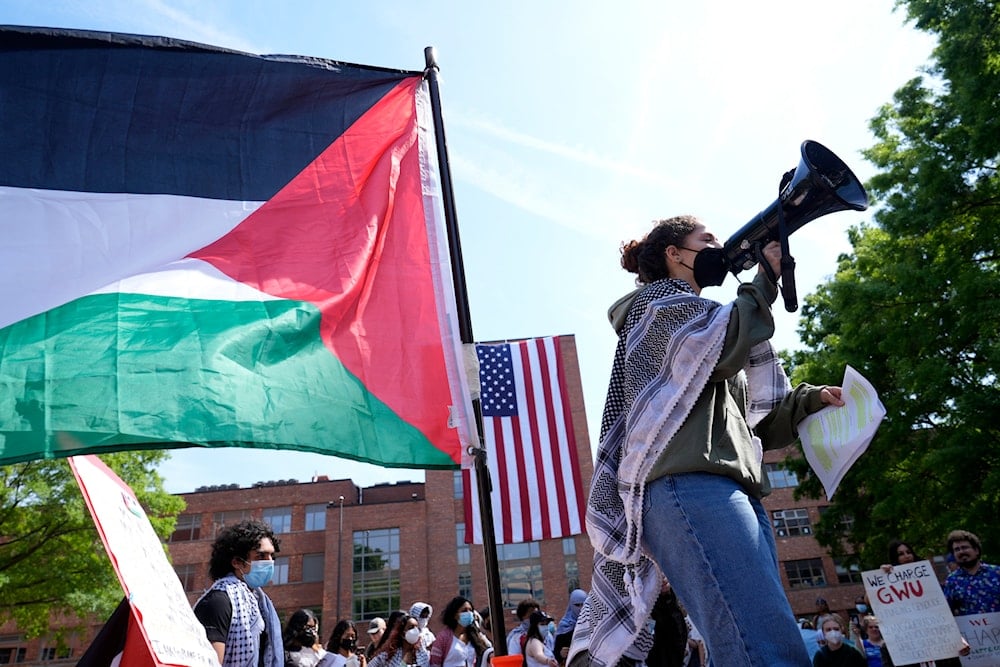13 Federal judges to refuse hiring Columbia graduates over protests
Over a dozen federal judges in the United States will refuse to hire graduates and undergraduates from Columbia University over the ongoing anti-war protests.
-

Demonstrators hold a mock trial on the campus of George Washington University in Washington, Friday, May 3, 2024, to protest the Israeli war on Gaza (AP)
The crackdown on student protesters in the United States intensified as 13 federal judges said they would not be hiring graduates and undergrads from Columbia University over the ongoing pro-Palestine protests, Axios reported on Tuesday.
However, one key thing is that the judges, all of whom are conservative, will not be hiring Columbia students not because of the ongoing peaceful protests or the harsh response to them, but rather because the response was not as harsh as they deem to be fit.
Columbia has "become an incubator of bigotry" and has "disqualified itself from educating the future leaders of our country," the judges said in a letter to the university's president, stressing that they had "lost confidence in Columbia as an institution of higher education."
The judges are demanding that Columbia University enact serious consequences for the students and faculty members who partook in the protests as they gain more momentum across the country, which is also being met with an increased crackdown from the authorities who seek to stifle free speech.
Moreover, they claim that Columbia's lack of action against the protesters has tarnished its "once-distinguished reputation" and that it must punish the protesters in order to reclaim it.
The conservative judges underlined that the university must remain "neutral" while protecting freedom of speech on campus as they work on increasing the diversity of viewpoints throughout the university.
They claim the response was not harsh enough although countless protesters were arrested with Columbia suspending some of the students involved while threatening others with expulsion. It is also not enough that they investigated at least two professors for criticizing the Israeli occupation for its brutality in Gaza.
This comes as protests focusing on the dire humanitarian situation in Gaza and the unbearable civilian death toll broke out on college campuses across the United States, notably at Columbia University, where demonstrators occupied last week a building on campus, blocked entrances, and displayed a Palestinian flag outside a window of the Hamilton Hall.
In the same context, an autonomous group has reclaimed Hamilton Hall and renamed it "Hind's Hall" in tribute to Hind Rajab, a six-year-old Palestinian child who was killed at the hands of the Israeli occupation forces in Gaza, according to CU Apartheid Divest (CUAD), a coalition of pro-Palestinian student organizations.
Suppression of protests
The President of Columbia University faced increased pressure in late April as a campus oversight committee strongly condemned her administration's actions in suppressing a pro-Palestine demonstration in the school.
After Columbia students established their Gaza Solidarity Encampment on April 17, University President Nemat Minouche Shafik summoned the NYPD to the campus to disperse the demonstrations, resulting in the arrest of over 100 students. But shortly after, outraged by the footage of their fellow students being arrested, a new group of students arrived on campus and set up another encampment in protest.
The Columbia University Senate passed a resolution stating that Shafik's administration had eroded academic freedom and disregarded the privacy and due process rights of students and faculty members by involving the police and terminating the protest.
"The decision... has raised serious concerns about the administration's respect for shared governance and transparency in the university decision-making process," it said.
The Senate, predominantly comprising faculty members and other staff with a minority representation of students, refrained from explicitly mentioning Shafik in its resolution and opted for a less severe tone than a censure.
Columbia spokesperson Ben Chang stated that the administration shared the Senate's objective of restoring calm to the campus and was dedicated to maintaining an ongoing dialogue.

 4 Min Read
4 Min Read








